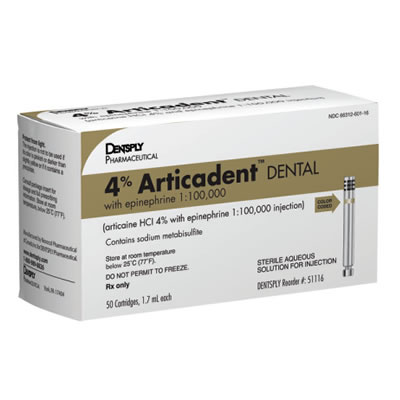What is Articaine Epinephrine?
 Articaine and epinephrine is an anesthetic (numbing medicine) that blocks the nerve impulses that send pain signals to your brain.
Articaine and epinephrine is an anesthetic (numbing medicine) that blocks the nerve impulses that send pain signals to your brain.
Articaine and epinephrine is used as an anesthetic for dental procedures.
Articaine and epinephrine may also be used for other purposes not listed in this medication guide.
What is the most important information I should know about Articaine Epinephrine?
You should not receive articaine and epinephrine if you have ever had an allergic reaction to any type of numbing medicine.
Before receiving this medication, tell your dentist if you have high or low blood pressure, asthma or a sulfite allergy, or a history of seizures.
This medication can cause numbness for an extended period of time. Avoid eating, chewing gum, or drinking hot liquids until the feeling in your mouth has returned completely. Chewing while your mouth is numb could result in a bite injury to your tongue, lips, or inside of your cheek.
What should I discuss with my healthcare provider before taking Articaine Epinephrine?
You should not receive articaine and epinephrine if you have ever had an allergic reaction to any type of numbing medicine.
Before receiving articaine and epinephrine, tell your dentist if you are allergic to any drugs, or if you have:
- low or high blood pressure
- asthma or a sulfite allergy; or
- a history of seizures
FDA pregnancy category C. This medication may be harmful to an unborn baby. Before you receive articaine and epinephrine, tell your dentist if you are pregnant.
It is not known whether articaine and epinephrine passes into breast or if it could harm a nursing baby. Before you receive articaine and epinephrine, tell your dentist if you are breast-feeding a baby.
Articaine Epinephrine Side Effects
What are the possible side effects of Articaine Epinephrine?
Get emergency medical help if you have any of these signs of an allergic reaction: hives; difficulty breathing; swelling or puffiness of your face, lips, tongue, or throat.
Tell your caregivers at once if you have a serious side effect such as:
- weak or shallow breathing
- slow heart rate, weak pulse
- feeling like you might pass out
- swelling in your face
- swollen or bleeding gums
- anxiety, confusion, restless feeling, tremors or shaking
- blurred vision, ringing in your ears; or
- seizure (convulsions)
Less serious side effects may include:
- tongue pain or swelling, mouth sores
- nausea, vomiting, constipation, diarrhea, upset stomach
- increased thirst, drooling
- nervousness, dizziness, drowsiness
- ear pain, neck pain, joint or muscle pain
- unusual or unpleasant taste in your mouth
- numbness or tingly feeling
- mild skin rash or itching; or
- runny nose, sore throat
This is not a complete list of side effects and others may occur. Tell your doctor about any unusual or bothersome side effect. You may report side effects to FDA at 1-800-FDA-1088.
Articaine Epinephrine Interactions
What other drugs affect Articaine Epinephrine?
Before receiving articaine and epinephrine, tell your dentist if you are using any of the following drugs:
- cold medicine, diet pills, stimulants, or medication to treat ADHD
- medicine to treat a psychiatric disorder (Haldol, Inapsine, Thorazine, Prolixin, Serentil, Mellaril, and others)
- medication to treat nausea and vomiting, such as Compazine or Motillium; or
- an MAO inhibitor such as isocarboxazid (Marplan), phenelzine (Nardil), rasagiline (Azilect), selegiline (Eldepryl, Emsam), or tranylcypromine (Parnate)
This list is not complete and there may be other drugs that can interact with articaine and epinephrine. Tell your dentist about all the prescription and over-the-counter medications you use. This includes vitamins, minerals, herbal products, and drugs prescribed by other doctors.
What should I avoid while taking Articaine Epinephrine?
This medication can cause numbness for an extended period of time. Avoid eating, chewing gum, or drinking hot liquids until the feeling in your mouth has returned completely. Chewing while your mouth is numb could result in a bite injury to your tongue, lips, or inside of your cheek.
Articaine Epinephrine Dosage
How should I take Articaine Epinephrine?
Articaine and epinephrine is given as an injection that is usually placed into the gum area inside your mouth. You will receive this injection in a dentist’s office or oral surgical setting.
What happens if I overdose on Articaine Epinephrine?
Tell your caregivers right away if you think you have received too much of this medicine.
Overdose symptoms may include extreme drowsiness, fainting, seizure (convulsions), shallow breathing, or slow heart rate.
What happens if I miss a dose of Articaine Epinephrine?
Since articaine and epinephrine is given as needed before a dental procedure, you are not likely to be on a dosing schedule.
Edited from everydayhealth.com
